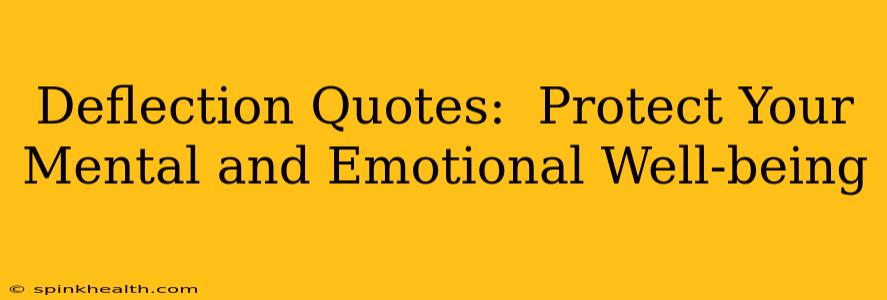In today's fast-paced world, navigating challenging conversations and negativity can feel overwhelming. Learning to deflect negativity and protect your mental and emotional well-being is crucial. This isn't about being rude or dismissive; it's about setting healthy boundaries and prioritizing your own peace of mind. This article explores the power of deflection, offering insightful quotes and practical strategies to help you navigate difficult situations with grace and self-respect.
What is Deflection in the Context of Mental and Emotional Well-being?
Deflection, in this context, isn't about avoiding problems or pretending they don't exist. Instead, it's a skillful technique for managing negative interactions without absorbing the negativity. It's about redirecting the conversation, setting boundaries, and protecting your energy. Think of it as a shield, protecting you from the barbs of negativity while still allowing for healthy communication. This might involve changing the subject, refusing to engage in unproductive arguments, or simply stating your boundaries clearly.
Powerful Deflection Quotes to Inspire and Empower
Here are some powerful quotes that encapsulate the essence of healthy deflection:
-
"The best way to deal with negativity is to ignore it." — This simple yet profound statement highlights the power of choosing not to engage with negativity. Sometimes, the best response is no response.
-
"You can't control what others do, but you can control how you react." — This quote underscores the importance of focusing on your own responses rather than trying to control others' behavior. This is a core principle of emotional regulation and self-care.
-
"Don't let the noise of others' opinions drown out your own inner voice." — This emphasizes the importance of trusting your intuition and prioritizing your own well-being over external validation. It's about staying true to yourself, even when facing criticism.
-
"Energy is precious. Protect yours." — This quote succinctly summarizes the importance of safeguarding your mental and emotional energy from draining interactions.
How to Effectively Use Deflection Techniques
While quotes offer inspiration, implementing effective deflection requires practice. Here are some practical strategies:
1. Setting Boundaries: Learning to say "no" and establishing clear boundaries is paramount. This protects your time, energy, and mental space.
2. Gray Rock Technique: This method involves minimizing your emotional responses in the face of negativity. You become an "uninteresting" rock, unresponsive to attempts to provoke or upset you.
3. Changing the Subject: Gently redirecting the conversation to a more positive or neutral topic can defuse tense situations.
4. Assertive Communication: Clearly stating your feelings and needs without aggression can effectively set boundaries and protect yourself from negativity. For instance, you might say, "I understand your perspective, but I'm not comfortable discussing this further."
5. Focusing on Solutions: Instead of dwelling on problems, focus on finding solutions. This shifts the conversation from negativity to constructive action.
Frequently Asked Questions (PAAs)
Q: Is deflection passive-aggressive?
A: No, deflection, when used correctly, isn't passive-aggressive. Passive-aggressiveness involves indirect expressions of anger or resentment. Healthy deflection is about protecting your well-being through assertive communication and setting boundaries. The key difference lies in intention and communication style.
Q: How do I know when to deflect versus address a concern?
A: Consider the context and the nature of the interaction. If the interaction is unproductive, draining, or abusive, deflection is a healthier choice. If it's a constructive conversation where addressing a concern can lead to resolution, direct communication might be more appropriate.
Q: Can deflection be harmful?
A: Yes, if used excessively or inappropriately, deflection can be harmful. It's crucial to balance deflection with open communication and addressing legitimate concerns. Overusing deflection might lead to unresolved issues and strained relationships.
Q: What if deflecting makes the other person angry?
A: It's important to remember that you can't control other people's reactions. Your priority is your own well-being. If someone reacts angrily to your attempts at healthy deflection, it reflects their behavior, not yours. In such situations, consider distancing yourself from the source of negativity.
Conclusion:
Mastering the art of deflection is a powerful tool for protecting your mental and emotional well-being. By incorporating these strategies and embracing the wisdom of the quotes presented, you can navigate challenging interactions with grace, self-respect, and a renewed focus on your own well-being. Remember, prioritizing your mental health is not selfish; it's essential.

